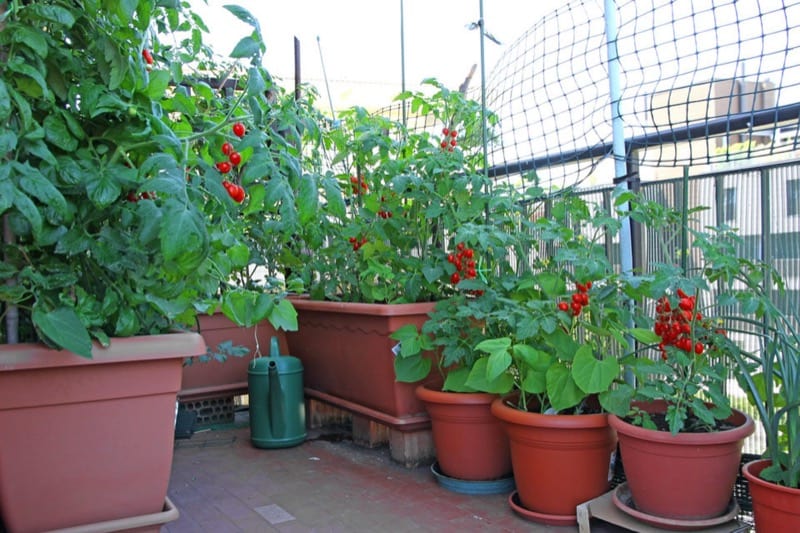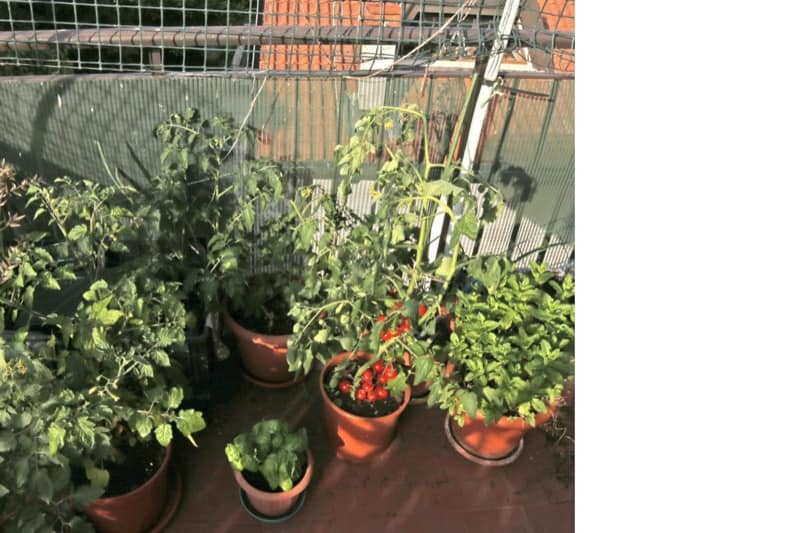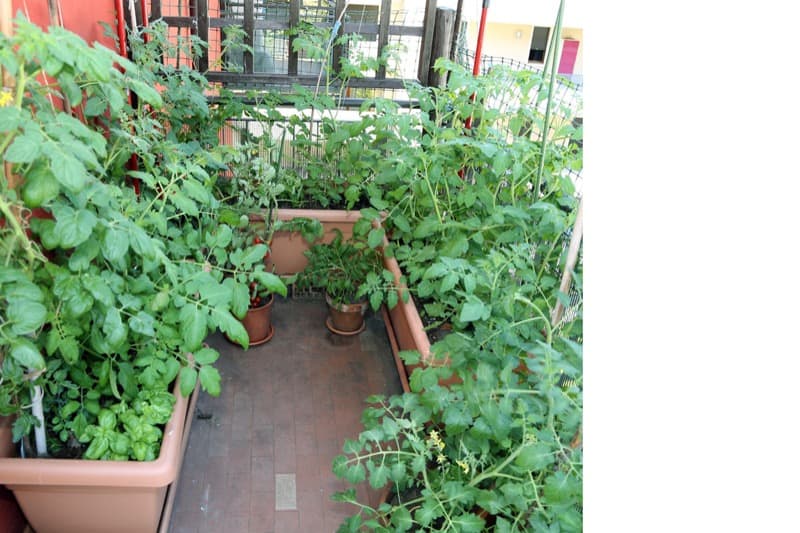Do you love fresh vegetables, but lack outdoor space to start your own vegetable garden?
Starting a balcony vegetable garden is very simple to do, and you can grow just about anything you’d like in the limited space available.
This guide will help you decide whether or not you should start a balcony vegetable garden. I’ll share factors to consider for how to start a balcony vegetable garden and how to maintain it once you’ve started.
Best Herbs and Vegetables to Grow on the Balcony
Pretty much anything can be grown on your balcony, depending on the conditions. If there is something that you love to eat, then try growing it. That being said, some plants lend themselves to a balcony garden.
- Rosemary – This aromatic herb is a great addition to a vast array of dishes, from chicken to potatoes. The great thing about rosemary is that although it doesn’t grow so much in winter, it keeps its leaves and looks good all year round.
- Peas and Beans – Legumes like a sunny spot, and because they are climbers, they are a great way to utilize as much space as possible on your balcony. They are also easy to dry and save, so you can keep growing them year after year. The flowers are a variety of colors, so they look beautiful in the spring, and you can eat young pods straight off the plant.
- Tomatoes – With so many tomato varieties, it will be easy to find a tomato plant that fits in your space. You can even find hanging varieties that can be grown in hanging baskets if you’re short on space. Cherry tomatoes are a favorite as they’re small and light, so can flexible with where it grows.
- Strawberries – Strawberries are a delight to grow, and you should be able to get two seasons out of them before they become less productive. Strawberries can also be grown in hanging baskets, and they do just as well in toughs, pots, or even grown vertically.
- Mint – Mint is highly prolific and can be grown anywhere. Even with an outdoor garden, most people choose to grow their mint in pots to stop it from taking over their garden. Great as a fresh tea or in a mojito!
Take a look at the Easiest Vegetables to Grow article.

Factors to Consider when Starting a Balcony Vegetable Garden
Let’s take a look at some of the things you need to think about when deciding whether or not to start a balcony or patio garden.
1. Available Space and Enclosure
The first thing you want to know is how much space you have available. A lot of balconies and patios don’t have enough room to use long or wide container. So, if you have a small balcony, you’ll need to use smaller pots.
Is your balcony or patio open or enclosed? These are important considerations, because some plants require more sun than others. For example, peas and beans prefer full sun, while strawberries prefer partial shade. I’ll cover more about open vs enclosed patios below.
If you live in a condo building, check with your management company to see if you can use any common areas to grow plants. Some buildings allow residents to grow food in their own gardens, which could give you access to more space than you might have thought of.
2. Available Sunlight on the Balcony
Available hours of sun is a big factor in what you will be able to grow on your balcony. Most fruit and vegetables like to be in full sun, which means at least six hours of direct sunlight per day in midsummer.
Mediterranean herbs like basil and oregano won’t grow well in the shade, and tomatoes will need many hours of sunlight to ripen.
Having too much sun can be fixed more easily than not having enough sun, because you can hang up a sheet to keep the sun off any plants that are wilting on particularly hot days.
But don’t be put off if you have a shady balcony, as many edible plants love a shady spot. Salad leafy greens like lettuce, Swiss chard, and rocket will actually grow better if they are not in direct sun for long periods.
Radishes will also tolerate shade and have the great benefit of germinating and growing pretty fast. Sow a few every couple of weeks for a steady crop throughout the summer.
Learn more about How Much Sun Vegetable Gardens Need.
3. How Cold or Hot is it on the Balcony?
In order to germinate plants, the soil will need to be between 35°F and 60°F, depending on the plant. The good news is that the soil in pots will warm a lot faster than in the ground, and you should be able to germinate your seeds more easily.
Vegetables like tomatoes, peppers, and legumes will not survive in temperatures lower than 32°F, and all plants will suffer if the temperature exceeds 122°F. However, you can get plant varieties that are pretty hardy in cold temperatures too.
In warm weather locations, be sure to give enough water and shade to keep the plants healthy.
4. How Windy Does It Get?
If you’re growing on an open balcony or patio, it’s going to get windy. That’s especially true with high-rise balconies.
However, there are many vegetables that will be tolerant of a little wind, and there are some tricks to make conditions more favorable.
The main issue is that wind will dry out the soil, so planting in plastic pots and adding a thick layer of mulch can help protect the vegetable plants.
Try to stand your containers next to a wall to get them out of the direct wind and use fencing screens to provide more shelter.
If the wind is consistently fierce, it’s best to grow root vegetables like carrots, garlic, and potatoes that won’t run the risk of being blown over.
5. Types of Containers and Pots for the Balcony
Plastic pots are preferable for growing on a balcony. While terracotta pots might be more aesthetically pleasing, you have to consider the weight you are placing on your balcony.
Terracotta pots are much heavier than plastic pots. Soil and water are pretty heavy too, so saving weight where you can is a must.
Make sure your pots have a saucer placed under your pot to catch excess water but be careful not to use pots that don’t have drainage holes as these can waterlog your plants.
Get the right size pot for your plant, and don’t let it become pot-bound. If roots are coming through the holes in the bottom of your container, then it’s time to size up and repot.

6. Right Soil for Vegetable Gardens on Balcony
As with the pots, weight and water retention are the main factors when choosing what soil is right for growing on a balcony.
Growing potted plants has the same issues, whether they are on a balcony or in an outdoor garden. You want moist soil, but you don’t want the roots to become waterlogged, nor do you want the soil to dry out.
The best kind of soil to use is a quality potting soil mix, or you can make your own by using a blend of organic and inorganic materials.
Here’s how to DIY homemade potting mix:
- First, put a layer of gravel at the bottom of your pot to aid drainage and stop the roots from sitting in water.
- Next, make up your potting mix.
- Use compost or worm castings for nutrition and then lightweight materials like wood chips and peat moss for water retention.
- Perlite and vermiculite are great lightweight and moisture-retentive non-organic materials that can also be added to the mix.
Learn more about the Best Potting Soil for Vegetables and Best Compost to Use in Vegetable Gardens.
7. Watering the Vegetable Garden on Balcony
Watering your balcony garden is extremely important as plants in pots can dry out extremely quickly in sunny and windy conditions.
Keep the soil moist, but not wet. It’s best to give your plants a good soak when they really need, it rather than watering them little and often.
If your balcony is exposed to rain, make sure you empty the plant saucers to avoid waterlogging. Rainwater is preferable to tap water in most cases, so if you have space for a small water bucket on your balcony to catch the rain, your plants will benefit.
If you are going away for a few days and you are worried about watering, fill a bottle with water and put a small hole in its cap. Put the cap back on and bury the neck of the bottle in the soil. The water will slowly drain into the soil while you’re away.
8. Fertilizing and Adding Nutrients
When growing in pots, it is inevitable that you will need to add fertilizer when the vegetable plants are fruiting. This is especially true if you are growing heavy feeders like tomatoes or squash.
- Learn more about Fertilizers for Vegetable Gardens.
Liquid fertilizers are usually the way to go for a balcony garden, as you can add them to your watering can once a week.
Homemade liquid fertilizers can be made with a variety of things. Nettles and comfrey steeped in water make great feed for tomatoes, and soaked eggshells can help blossom-end rot in squash.
If you have the space for a worm farm, you can use the worm castings to make worm tea feed, and you can buy or source compost to make compost tea.
Keep in mind that there are some plants that won’t respond well to fertilizer and shouldn’t need to be fed at all. Most salad leaves will be fine with just water. Herbs also don’t typically need any additional fertilizers.
9. Managing the Pests
The pests conversation is usually where balcony gardening comes into its own. You will be able to control pests far more effectively with balcony gardens than in a conventional garden.
Many garden pests come from the soil, and by growing plants in pots, you are reducing the chance of repeat pest infestations.
Chances are, any bugs like aphids or ants that you find will have come on one of the plants or in contaminated soil.
Aphids can be sprayed off a plant, and if any bugs become a problem, consider changing the soil or getting rid of the afflicted plant.
Keep an eye out for caterpillars, slugs, and snails that might want to munch your bounty. These pests can be relocated or dealt with more harshly.
Balcony Vegetable Garden Tips
These are some of the top tips when you’re gardening on your balcony.
- Choose plants that suit your balcony space and situation.
- Use all the space available, including walls and hanging baskets.
- Grow climbing varieties like peas, beans, tomatoes, and cucumbers to maximize your space.
- Consider installing a small water bucket if you can. This will allow you to water your vegetables with clean rainwater.
- Using a worm farm can turn your food scraps into fertilizer. Compost can be a great source to increase the organic matter in the soil.
- Root vegetables are not off-limits!
- Plastic pots will be better for moisture retention and are a great deal lighter than terracotta pots.
- Prepare for wind!

Open vs. Enclosed Balcony Vegetable Garden
Whether you have an open or enclosed balcony or patio, you can still start a garden. Below I’ve listed the pros and cons of both types when it comes to growing vegetables.
Open Balcony Pros and Cons
Open Balcony Pros:
- Plants can get watered by the rain.
- More sunlight.
Open Balcony Cons:
- Exposed to the elements. Windier and less chance of shade or shelter.
- Usually quite small.
Enclosed Balcony Pros and Cons
Enclosed Balcony Pros:
- Plenty of vertical space for climbing plants and hanging baskets.
- Protected from harsh winds.
Enclosed Balcony Cons:
- Less sunlight.
- Plants will always need to be watered.
Here’s a good video on growing tomatoes on a balcony:
Starting a Balcony Vegetable Garden Final Thoughts
Starting a vegetable garden on your balcony is a great way to grow fresh produce without a large yard for an outdoor garden. It’s easy to maintain, and you’ll be rewarded with a harvest of delicious veggies year after year.
Here are other vegetable garden articles that will interest you:

